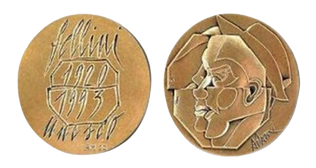ENRICO FULCHIGNONI AWARD
At its 37th edition, this Prix can be considered the most significant cinematographic acknowledgment awarded by ICFT-UNESCO to the movie presented at the Venice International Film Festival, best representing the values of peace and tolerance promoted by UNESCO. It is dedicated to the memory of the late ICFT President Enrico Fulchignoni, a distinguished official of UNESCO who served as the Responsible for Culture for a long time.
Fulchignoni was a director and a professor at the Sorbonne University. He was a great promoter of Neorealism in cinema and of rising stars such as Michelangelo Antonioni. Tireless and intrepid launcher of initiatives, Fulchignoni established the Ouagadougou, Damascus, MIFED and Moscow Festivals, as well as the creation of the Escluela Internacional del Cine Latinoamericano in Cuba and many other events. It is important to remember Venezia Genti, an official section of the Venice International Film Festival in the 1980s, dedicated to young authors, especially from emerging countries.
This Prix constitutes the ideal continuation of his work in this field. The winner of the Prix, who is awarded UNESCO’s “Medaglia Fellini”, is announced at the Festival during a dedicated press conference, whereas the awarding ceremony will take place at the UNESCO Headquarters in Paris.
HALL OF FAME
-
1989 Un Petit Monastere en Toscane by Otar Ioselani
-
1990 Couvre-Feu by Rachid Masarawi
-
1991 Le cri du coeur by Idrissi Ouédraogo
-
1992 Aguilas non cazan moscas by Sergio Cabrera
-
1993 Kardiogramma by Darzhan Omirbaev
-
1994 Small Wonders by Allen Miller
-
1995 Kolonel Bunker by Kujtim Cashku
-
1996 La strana storia della banda sonora by Francesca Archibugi
-
1997 Civilisées by Randa Chahal Sabbag
-
1998 Tsion, Auto-emancipatie by Amos Gitai
-
1999 Roozi Key zan shodam by Marziyet Meshkini
-
2000 Porto da minha infancia by Manuel de Oliveira
-
2001 11 September by Mira Nair, Samira Makhmalbaf, Claude Lelouch, Yusuf Shahin, Danis Tanović, Idrissa Ouédraogo, Ken Loach, Alejandro González Iñárritu, Amos Gitai, Sean Penn e Shōhei Imamura
-
2002 Kamur (Fango) by Dervish Zaim
-
2003 Land of Plenty by Wim Wenders
-
2004 La passione by Giosuè l’ebreo by Pasquale Scimeca
-
2005 La Dignidad de los nadies by Fernando Solanas
-
2006 Daratt by Mahamat-Saleh Haroun
-
2007 Corti del cinema marocchino by Various Authors
-
2008 Birdwatchers by Marco Bechis
-
2009 The Traveller by Ahmed Maher
-
2010 Miral by Julian Schnabel
-
2011 Tahrir 2011 by Various Authors
-
2012 L’intervalllo by Leonardo di Costanzo
-
2013 At Berkleley by Frederick Wiseman
-
2014 Inocente by Dave Lee
-
2015 Beasts of no nation by Cary Fukunaga
-
2016 Hotel Salvation by Shubhashish Bhutiani
-
2017 Human Flow by Ai Weiwei
-
2018 El Pepe, Una Vida Suprema by Emir Kusturica
-
2019 45 seconds of laughter by Tim Robbins
-
2020 Horshid by M. Majid and Scherza con I fanti by Gianfranco Pannone
-
2021 AMIRA by Mohamed Diab
-
2022 Nuclear by Oliver Stone
-
2023 Io capitano by Matteo Garrone
-
2024 The Fisherman by Zoey Martinson
-
2025 The Voice of Hind Rajab by Kaouther Ben Hania

Tim Robbins receives the 31st Enrico Fulchignoni Award

Director Oliver Stone with the Jury of the 34th Fulchignoni Award

The UNESCO Fellini medal
37th CICT-UNESCO "Enrico Fulchignoni" Award
Venice Lido, September 4th, 2025 - Now in its 37th edition, the “Enrico Fulchignoni” Award – named after its President, former Director of Culture at UNESCO, filmmaker, and professor at the Sorbonne – can be considered the most significant and longstanding film award granted by the CICT-UNESCO since 1989. It is presented to the film showcased at the Venice International Film Festival that best represents the values promoted by UNESCO.
The jury of the XXVII edition, composed of Pierpaolo Saporito, President a.i., CICT-ICFT – official partner of UNESCO, Gabriel Griffin Hall, Poet, Jasmina Bojic, Founder and President, UNAFF Travelling Film Festivals, Palo Alto/ Stanford University, USA, Alessandro Mandelli, Founder & CEO, Serially Italy, Vittorio Giacci, film critic, and Tiziana Maria Di Blasio, professor at Pontificia Università Gregoriana, is honored to announce that the winner of the 37th CICT UNESCO “Enrico Fulchignoni” Award at the 82. Venice International Film Festival is:
THE VOICE OF HIND RAJAB
by Kaouther Ben Hania
With the following motivation: “For the extraordinary testimony of the dramatic truth of war, conveyed through the voice of a child pleading for salvation. The authorial vision of Kaouther Ben Hania stands out for the conscious decision to keep every representation of violence off-screen, focusing instead on the account of the efforts to save the child, impeded by the senseless machinery of wartime bureaucracy. The Voice of Hind Rajab emerges as a manifestation destined to resonate for a long time in the conscience of the viewer. The unbearable sound of silence becomes an antidote against oblivion, unveiling not only the pain of Gaza, but also forcefully reminding us that suffering is universal.”
The jury awarded the UNESCO Fellini Medal to producers Nadim Cheikhrouha, Odessa Rae, and Andrea Romeo at a ceremony held at the Campari Lounge on September 4, 2025, congratulating director Kaouther Ben Hania, the cast, and the production team, including Brad Pitt and Joaquin Phoenix.




